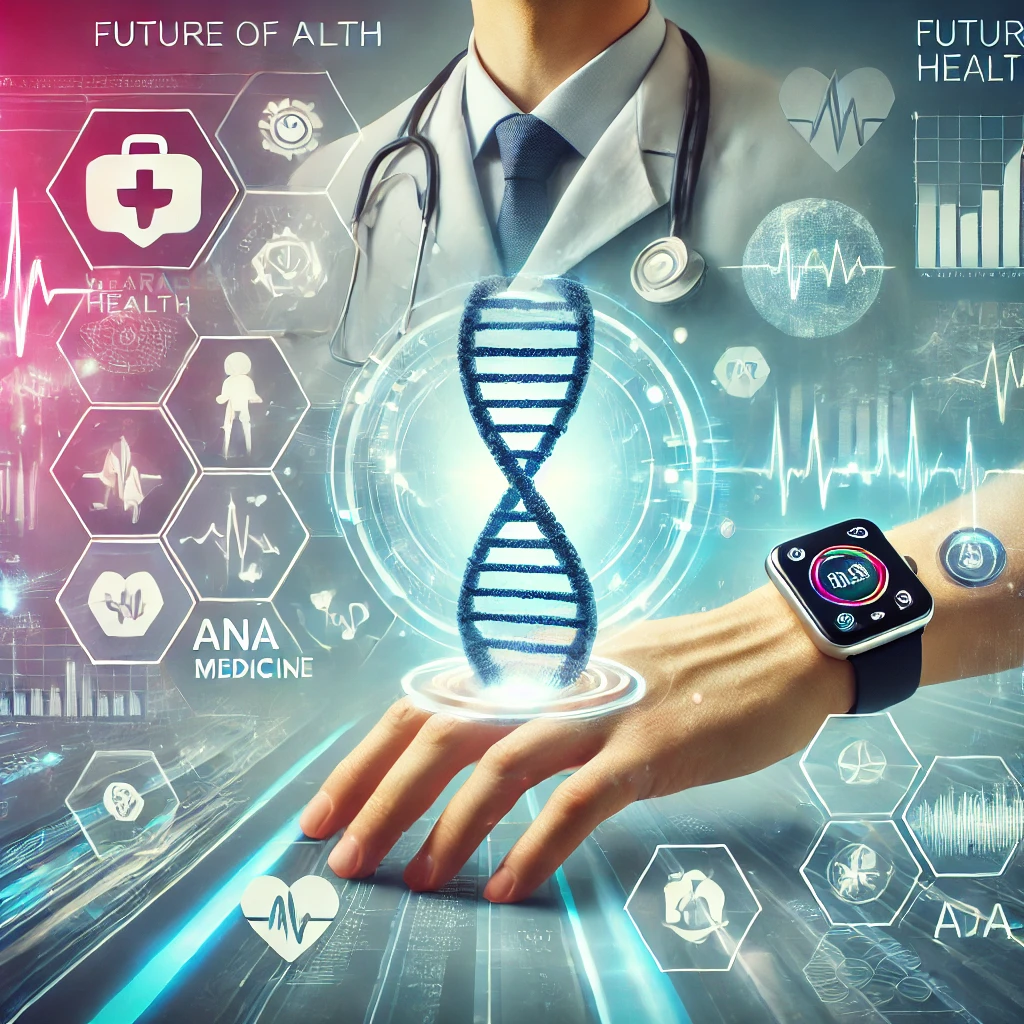The Future of Health: Top Trends to Watch in 2024 and Beyond
The healthcare industry is rapidly evolving, driven by advancements in technology, personalized care, and a growing emphasis on preventive health and wellness. As we move into 2024 and beyond, several emerging trends promise to reshape how we approach healthcare, manage our well-being, and interact with medical professionals. From telemedicine to wearable health technology, the future of health is geared towards more personalized, accessible, and proactive care. In this in-depth article, we will explore the top health trends to watch in the coming years and provide insight into how they may impact our lives.
1. Telemedicine and Virtual Healthcare
Telemedicine experienced a massive surge in popularity during the COVID-19 pandemic, and it shows no signs of slowing down. This trend has revolutionized the way healthcare is delivered, allowing patients to consult with doctors and specialists from the comfort of their homes. Telemedicine offers convenience, accessibility, and the potential to reduce healthcare costs by eliminating the need for in-person visits.
Why Telemedicine Will Continue to Grow:
- Accessibility: Telemedicine bridges the gap for people living in remote areas or those with mobility issues, providing access to healthcare that might otherwise be unavailable.
- Convenience: Patients can schedule virtual visits without the need for long wait times or traveling to a clinic, making it easier to fit healthcare into busy schedules.
- Cost-Effectiveness: Virtual visits often cost less than in-person consultations, and they can reduce the need for hospitalizations or emergency room visits.
What to Expect in 2024 and Beyond:
- Integration with Wearable Devices: Telemedicine platforms are expected to integrate more seamlessly with wearable health devices, allowing real-time sharing of health data such as heart rate, glucose levels, and sleep patterns.
- Expansion of Telehealth Services: We can anticipate a broader range of telehealth services, including mental health support, physical therapy, and even dental care consultations.
- AI-Driven Diagnostics: AI and machine learning will play a growing role in virtual healthcare, assisting doctors in diagnosing conditions and recommending treatments based on patient data and medical history.
2. Wearable Health Technology
Wearable health technology has exploded in popularity over the last few years, with devices like smartwatches, fitness trackers, and continuous glucose monitors becoming commonplace. These devices provide real-time health data, empowering users to take control of their well-being by tracking vital signs, physical activity, sleep, and other health metrics.
Why Wearable Technology is Transforming Healthcare:
- Real-Time Monitoring: Wearables provide continuous monitoring of key health metrics, allowing users to track changes in their health over time and detect potential problems early.
- Proactive Health Management: With wearables, individuals can take a more proactive approach to their health, making informed decisions about exercise, diet, sleep, and stress management.
- Remote Patient Monitoring: Healthcare providers can use wearable devices to remotely monitor patients with chronic conditions, reducing the need for frequent in-person checkups.
What to Expect in 2024 and Beyond:
- More Advanced Sensors: Wearable devices will likely include more advanced sensors capable of measuring blood pressure, hydration levels, and even emotional states like stress and anxiety.
- Wearables for Disease Prevention: Companies are working on wearables that can predict the onset of diseases, such as heart attacks or strokes, by continuously monitoring biometrics and detecting early warning signs.
- Health Data Integration: Wearables will become increasingly integrated with electronic health records (EHRs), allowing doctors and patients to share data seamlessly for more personalized care.
3. Personalized and Precision Medicine
Personalized medicine, also known as precision medicine, is a medical approach that tailors treatments to the individual characteristics of each patient. Rather than a one-size-fits-all approach, personalized medicine considers genetic makeup, lifestyle factors, and environmental influences to create targeted therapies and treatment plans.
The Impact of Personalized Medicine:
- Genomic Data: Advances in genetic testing allow doctors to analyze a patient’s genome, identifying genetic mutations or predispositions to certain diseases. This enables more accurate diagnoses and personalized treatment strategies.
- Targeted Therapies: Personalized medicine is particularly impactful in cancer treatment, where targeted therapies can be developed based on the genetic profile of a tumor, improving the effectiveness of treatment and reducing side effects.
- Predictive Medicine: By analyzing genetic and lifestyle data, personalized medicine can predict a patient’s risk for specific diseases, allowing for early interventions and preventive measures.
What to Expect in 2024 and Beyond:
- Expanded Access to Genetic Testing: As the cost of genetic testing continues to drop, more people will have access to comprehensive genomic data, which can guide personalized treatment plans for a wide range of conditions.
- Pharmacogenomics: This field studies how a person’s genetic makeup affects their response to drugs. Expect to see more medications prescribed based on individual genetic profiles, reducing adverse drug reactions and increasing treatment efficacy.
- AI and Big Data in Precision Medicine: AI will play a significant role in analyzing massive datasets, including genetic, clinical, and lifestyle information, to help doctors create highly personalized treatment plans.
4. Mental Health Technology
Mental health has become a major focus in healthcare, with a growing recognition of the need for accessible, effective, and innovative mental health services. Technology is playing an increasingly prominent role in this space, offering new tools to support mental well-being.
Key Innovations in Mental Health Technology:
- Mental Health Apps: Mobile apps offering guided meditation, cognitive behavioral therapy (CBT), mood tracking, and stress management are becoming a cornerstone of mental health care.
- Virtual Therapy: Teletherapy platforms allow individuals to access mental health services remotely, breaking down barriers to care such as cost, stigma, and geographic limitations.
- AI in Mental Health: AI is being used to develop chatbots and digital assistants that can provide support for people experiencing anxiety, depression, or stress. These tools can offer immediate help and resources, complementing traditional therapy.
What to Expect in 2024 and Beyond:
- Personalized Mental Health Solutions: Mental health apps and tools will become more personalized, offering customized programs based on user behavior, preferences, and mental health history.
- Integration with Wearables: Mental health technology will integrate with wearable devices to track biometric data related to stress, sleep, and mood. This data can be used to provide real-time mental health interventions.
- VR and AR in Therapy: Virtual reality (VR) and augmented reality (AR) are expected to play a larger role in mental health therapy, offering immersive environments for exposure therapy, relaxation training, and mindfulness practices.
5. Artificial Intelligence in Healthcare
Artificial intelligence (AI) is poised to revolutionize healthcare, providing new ways to analyze medical data, improve diagnostics, and enhance patient care. AI has the potential to speed up medical research, personalize treatment, and optimize healthcare delivery.
How AI is Transforming Healthcare:
- Improved Diagnostics: AI algorithms can analyze medical images, lab results, and clinical data to identify diseases more quickly and accurately than traditional methods.
- Predictive Analytics: AI can analyze patient data to predict outcomes, such as the likelihood of readmission or the progression of a disease. This allows for more proactive and targeted interventions.
- Automating Administrative Tasks: AI-powered tools are streamlining administrative tasks such as scheduling, billing, and maintaining patient records, freeing up more time for healthcare providers to focus on patient care.
What to Expect in 2024 and Beyond:
- AI-Powered Radiology and Pathology: AI tools will become increasingly adept at analyzing medical images, helping radiologists and pathologists detect diseases like cancer at earlier stages.
- AI in Drug Discovery: AI is being used to accelerate drug discovery by analyzing biological data and identifying potential drug candidates. This could lead to faster development of new medications and treatments.
- AI in Patient Monitoring: AI-powered tools will enable continuous remote monitoring of patients with chronic conditions, analyzing their data in real-time to detect changes and recommend adjustments to their treatment.
6. Health and Wellness Apps
Health and wellness apps are continuing to rise in popularity as people seek tools to improve their physical, mental, and emotional well-being. From fitness tracking to nutrition guidance, these apps offer personalized recommendations based on user behavior and goals.
Trends in Health and Wellness Apps:
- Fitness and Exercise Apps: Apps that provide workout routines, track fitness progress, and offer virtual coaching are becoming more sophisticated, incorporating AI to create personalized plans.
- Nutrition and Meal Planning Apps: Nutrition apps now offer personalized meal plans based on dietary preferences, goals, and health conditions. These apps use AI to provide recommendations and track calorie intake.
- Mindfulness and Meditation Apps: As mental health becomes a priority, mindfulness and meditation apps are integrating more features, such as sleep tracking, stress management, and guided therapy sessions.
What to Expect in 2024 and Beyond:
- Greater Personalization: Health and wellness apps will use AI and machine learning to offer more personalized recommendations, helping users achieve their health goals more effectively.
- Holistic Health Solutions: We can expect to see apps that integrate physical, mental, and emotional well-being into one platform, providing users with a comprehensive approach to health management.
- Social and Community Features: More apps will include social features that allow users to connect with others for support, motivation, and shared wellness goals.
Conclusion
The future of health is an exciting blend of technology, personalization, and accessibility. Trends such as telemedicine, wearable health technology, personalized medicine, AI in healthcare, and mental health innovations are revolutionizing how we approach well-being. As these technologies continue to evolve, we can expect healthcare to become more proactive, data-driven, and tailored to individual needs. Staying informed about these emerging trends will not only help you take charge of your health but also prepare you for a future where healthcare is more accessible, personalized, and efficient than ever before.













Recent Comments